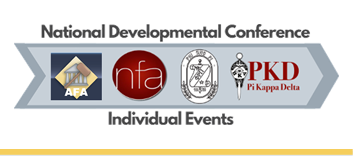Document Type
Debate and IE Relationships
Abstract
I do not recall the last time I was at any sort of gathering of directors of forensics for any length of time when the discussion did not at some point turn to the issue of program mortality. Everyone has a story to tell of a program that recently ended, or is at risk of doing so. The most difficult moment in my own forensic career came only three years ago, when secret political maneuverings by a couple of self-aggrandizing administrators (who have since flown from their positions) put an end to a forensics program that was over 100 years old and had produced an average of two national champions over the previous twenty of those years. My story is not unusual; Derryberry (1991, p. 19) cited similar concerns as he reviews the literature and argues that forensic programs are always at the risk of the budget pen. In the current economy, I am convinced that only a few programs—those fortunate enough to be funded by major endowments or alumni/donor agreements— are more than one new administrator away from elimination. In an activity with so many clear educational benefits that I am not even going to bother to review the pertinent literature, it is astonishing to me that this situation endures. Having won every argument made to save my previous program, refuting every single false claim made by the administration for the "unfortunate necessity" of its elimination and even winning the battle in the local press, I am convinced that we can no longer rely on the argumentation techniques of presenting our evidence and assuming a rational audience. We won the popular vote of the community in my situation; but the two administrators at the foot of the program's elimination were in no mood for rationality. Shrewd deal-making and power-playing won the day, and forensics lost. Instead, I will argue in this paper that we need to embrace some of the movements in contemporary education and link forensics to them. Forensics can win these battles just as successfully as it can demonstrate its educational benefits, and by doing so, will have a chance to survive. I will also argue that the best way to reach this goal is to support the dual purpose, or "full-service," forensics program. I will begin by defining what I mean by a dual purpose program. Then, I’ll look at the justifications, both historical and potential, of such a program. Finally, and in the spirit of this developmental conference, I will suggest some possible ways to encourage dual purpose programs.
Creative Commons License

This work is licensed under a Creative Commons Attribution 4.0 International License.
Rights Statement
In Copyright https://rightsstatements.org/page/InC/1.0/?language=en
Recommended Citation
West, Terry L.
(2008)
"Facilitating Dual Service Programs: Imperatives for the Future of Forensics,"
Proceedings of the National Developmental Conference on Individual Events: Vol. 4:
Iss.
1, Article 34.
Available at:
https://cornerstone.lib.mnsu.edu/ndcieproceedings/vol4/iss1/34

